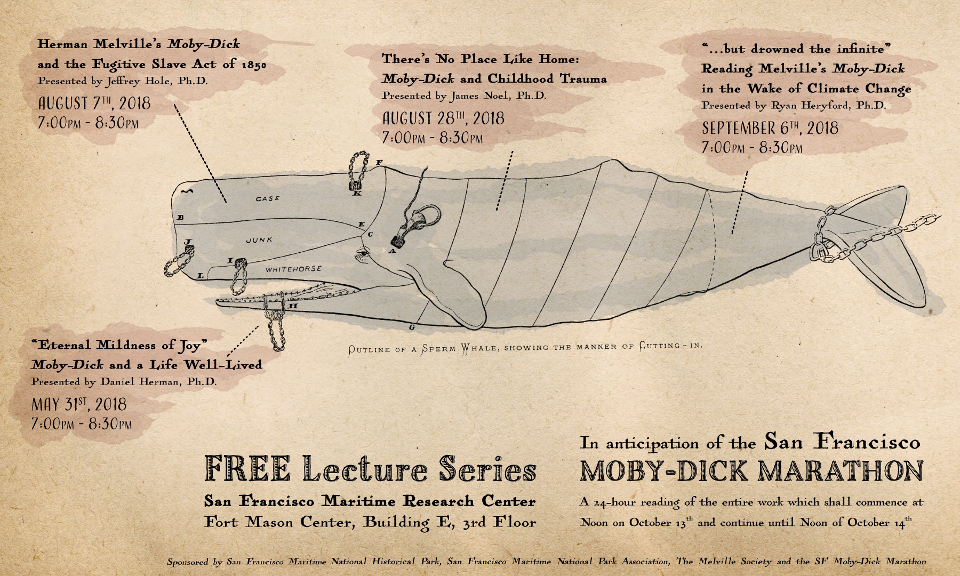News Release
You are viewing ARCHIVED content published online before January 20, 2025.
Please note that this content is NOT UPDATED, and links may not work. For current information,
visit https://www.nps.gov/aboutus/news/index.htm.

NPS image
|
Subscribe
|
Contact: Lynn Cullivan, 415-561-7006
San Francisco Maritime National Park, The San Francisco Maritime National Park Association, the Melville Society and the 2018 Moby-Dick Marathon present a summer Moby-Dick Marathon Lecture Series. All three lectures, scheduled in the San Francisco Maritime Research Center, Fort Mason Center, San Francisco, are free and open to the publicOn Tuesday, August 7, 2018 from 7-8:30pm
HERMAN MELVILLE’S MOBY-DICK AND THE FUGITIVE SLAVE ACT OF 1850
From correspondence with British publisher Richard Bentley in June of 1850, it appears that Herman Melville initially set out to write “a romance of adventure founded upon certain wild legends in the Southern Sperm Whale Fisheries.” This is not quite the narrative that entered into print a year later, however. After Melville had already begun work on his manuscript, President Fillmore, on September 18, 1850, signed legislation that would expand federal power for the interstate rendition of fugitive slaves. In this lecture, we will explore how Melville’s 1851 publication of Moby-Dick offers a critical representation of the politics and philosophical problems that emerged with the Fugitive Slave Act of 1850.
Presented by: Jeffrey Hole is Associate Professor of English at the University of the Pacific where he teaches courses in American and world literatures, including special topics on U.S. empire, slavery, and the field of literature and law. He has been honored with the Excellence in Undergraduate Research Mentoring Award, the Stephen E. Corson Award for the Distinguished Teaching of First Year Students, as well as The Graves Award in the Humanities. He is currently completing a book, Fugitive Inventions and the Force of Law: Literature in the Wake of the 1850 Compromise, which examines the relationships between nineteenth-century American literature and the tactics of fugitive slaves within the context of international law and extra-territorial reach of U.S. power in the wake of the 1850 Fugitive Slave Act. His most recent essays have appeared in the journals American Literature, Criticism, Telos, among others.
On Tuesday, August 28, 2018 from 7-8:30pm
THERE’S NO PLACE LIKE HOME: MOBY-DICK AND CHILDHOOD TRAUMA
Numerous critics have noted the ways that Moby-Dick provides insight into community and American life. The diverse crew aboard the Pequod is a fundamental starting place for scholars, and readers alike, to arrive at such an observation. For instance, one might perceive the hierarchical structure aboard the whaleship to reflect race relations in America during the nineteenth century. Nonetheless, the diversity of the crew is not confined to adult life, as one of the crew’s most significant characters is a young cabin boy named Pip. Though readers might feel that the Pequod is no place for a child, Pip’s presence aboard the whaler means that readers must deal with the ways that Ahab’s monomaniacal and catastrophic pursuit of a Leviathan could impact a child. Building on existing scholarship, this lecture will explore the matter of early trauma in Moby-Dick.
Presented by: James Gerard Noel an Assistant Professor at Los Medanos College in California and teaches developmental writing as well as literature classes. In addition to his work on classroom and pedagogical techniques, James is a Herman Melville scholar, and most of his research focuses on racial performance in the nineteenth century.
On Thursday, September 6, 2018 from 7-8:30pm
"...BUT DROWNED THE INFINITE": READING MOBY-DICK IN THE WAKE OF CLIMATE CHANGE
For many contemporary environmental writers and activists, the rising tides and acidifying waters of our world oceans have become productive symbols for generating ethically-engaged conversation in our current moment, referred to as "the Anthropocene," the proposed term for this geological epoch where human activity is now the primary force rendering irreversible impacts on global climate and conditions for life on earth. Yet, despite the proliferating images of melting ice and tidal takeovers, much of this current fascination with our rapidly-transforming seas has, thus far, been silent with regards to the ocean’s human histories. Reading through one of the most canonized texts in oceanic literature - Herman Melville's Moby-Dick, or the Whale - this talk will explore the relationship between Melville's representations of the ocean as an uninhabitable, threatening abyss, and his figurations of the ocean as a passageway for those seeking resources or refuge, fleeing violence or enduring it. Ultimately, this talk will suggest Moby-Dick as a necessary text for our own twenty-first century, allowing us to consider the inherent links between environmental and historical justice as we reimagine our planetary commitments to human and nonhuman communities.
Presented by: Ryan Heryford is an Assistant Professor of Environmental Literature in the Department of English at California State University, East Bay, where he teaches courses in nineteenth and twentieth century American literature, with a focus in eco-criticism and cultural narratives of environmental justice. He has published work on environmental thought in the works of William Faulkner, Herman Melville and Édouard Glissant. His current book-length project, The “Snugness of Being:” Nineteenth Century American Literary Vitalisms, explores the influence of nineteenth century environmental and bio-medical philosophy on constructions of self and subjectivity within the works of Edgar Allan Poe, Emily Dickinson, and Herman Melville.
About San Francisco Maritime National Historical Park
San Francisco Maritime National Historical Park, located at the west end of Fisherman’s Wharf, includes a fleet of historic ships, Visitor Center, Maritime Museum, Maritime Research Center, and the Aquatic Park Historic District. For more information, please call 415-447-5000 or visit nps.gov/safr, Twitter @SFMaritimeNPS, and Facebook @SanFranciscoMaritimeNHP. San Francisco Maritime National Historical Park offers assisted listening services on request. Sign Language interpreter services need to be requested at least five days in advance. Contact Accessibility Coordinator/Chief of Interpretation for more information at 415-859-6797, or e-mail us.
Last updated: July 19, 2018
